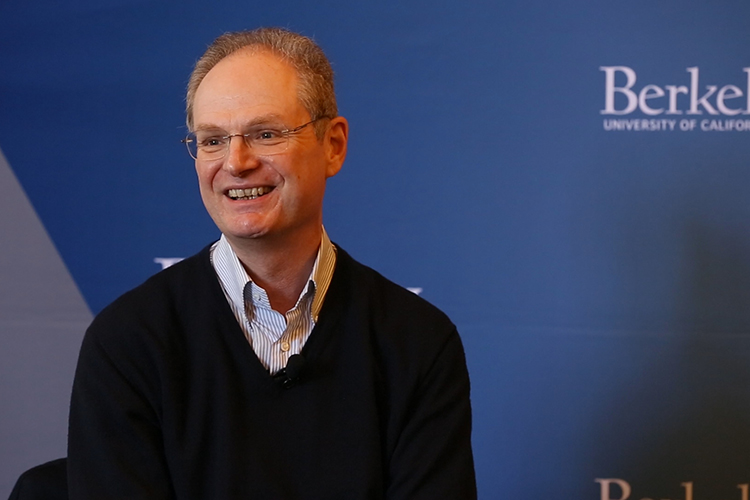Provost Alivisatos: In times of turmoil, how can we keep campus great?
“The financial challenges of today and our vision for where we want to be are very much connected,” top admin says.

February 12, 2018
UC Berkeley must be a place of innovation, collaboration and experimentation, the school’s number two administrator told a lunchtime crowd of students, staff and faculty on Monday.
After just six months as executive vice chancellor and provost, Paul Alivisatos said he was just starting to get his hands around the enormous breadth of his responsibilities: helping close a budget deficit, charting a strategic path forward for the university, searching for new revenue and reconsidering the purpose of a collegiate education.
“The financial challenges of today and our vision for where we want to be are very much connected,” Alivisatos told the crowd gathered at Alumni House. The event was part of Campus Conversations, a monthly series of events connecting UC Berkeley leaders with the campus community.
A serious discussion about Berkeley’s priorities, Alivisatos said, “is going to get us the financial picture that will give the kind of stability we need, so that a great public university can remain that way.”
In particular, Alivisatos, who is an accomplished professor of chemistry and materials science, said administrators, staff and faculty should build an academic curriculum that encourages critical thinking and experiential learning.
Undergraduates are starting companies while still enrolled in engineering courses, larger numbers of students are getting master’s degrees and Ph.D. candidates are finding they can’t just conduct research in an academic vacuum, he elaborated.
“A society needs people who create new knowledge to have a level of versatility that maybe they didn’t need 10 or 20 years ago,” he said, adding that degree programs should be training students how to be lifelong learners.
“Students want to have more learning not just within one discipline but in the context of problems that they really care about, and we have to change how we organize ourselves to do that,” he said.

Alivisatos spoke with Dan Mogulof, Assistant Vice Chancellor, Public Affairs. (UC Berkeley photo by Keegan Houser).
Understanding the organizing purpose of Berkeley, Alivisatos said, will help administrators set priorities, or make a compelling case to donors or state lawmakers.
Alivisatos also took questions from members of the audience, including concerns about state support of the university, rising tuition costs, bureaucratic procedures, athletics and the meaning of a public education when tuition and costs continue to rise.
As to the last question, a public university must have a mission of public service, Alivisatos said.
“There is an ethos that makes us public, and that is an ethos of public service,” he said.
Staff and faculty in attendance said they appreciated hearing from an administrator like Alivisatos, who spends much of his day in the conference rooms of California Hall.
“It is very obvious he has a real sense of what is happening on campus,” said Gilo Jeda, who ran a policy center at the School of Public Health before retiring two years ago. Jeda attended the event to see what Alivisatos would say about issues affecting retirees. “He is a real administrator’s administrator.”
Teresa Liu, a division manager for infectious diseases and vaccinology at the School of Public Health, said that while she wished Alivisatos had more time for hard questions from staff, she was glad to see him spending so much time thinking about students.
“I can see that a lot of (undergraduate) students learn by themselves,” she said. “We need to give them an environment where they can flourish.”
Future Campus Conversations scheduled this semester include Vice Chancellor for Administration Marc Fisher on March 22 and Chancellor Carol Christ on April 24. Campus Chief Financial Officer Rosemarie Rae spoke about the budget on January 26.
Contact Will Kane at [email protected]